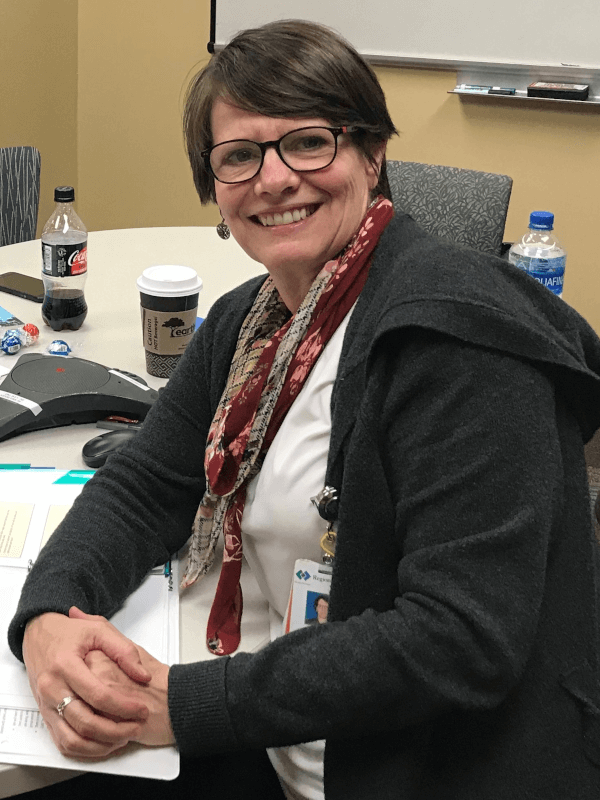
On the first Monday of every month, DTA convenes a community of Care Team Coaches from across the country. The purpose of these calls is for coaches who use DTA’s Coaching Reporting Tool to share notes and learn from one another on their coaching journeys. On our most recent call, we were able to feature an interview with Patty Drinkwine-Holmes. Patty is the Emergency Department Patient Liaison/ED Patient Experience Coach at Regions Hospital in St. Paul, MN.
Here’s a look at what Patty had to share with the group.
DTA: Patty, tell us a little bit about your background. How did you become a Care Team Coach?
Patty Drinkwine-Holmes: I was hired in May of 2012 for the coordinator role at Regions in the Emergency Department. I had some major life changes so I was changing careers from having my own business to health care. My first love would have been to write children’s books and to be a life coach. Through some more changes the doors opened up to work at Regions.
When the ED hired DTA to help us put together a program for coaching, I was invited to be in the original group. I loved it! When I was invited to be a coach for our ED, I was nervous, very nervous to coach my coworkers. I believe the feelings were mutual. But the training was so positive and strength-based that it gave me courage to start.
I quickly began to see the wisdom of coaching our own as our environment was quickly changing. As coaches we understand the challenges that staff are facing so in turn we can encourage them with what they do well and to give some new things to try. In some ways the practices have turned into principles as the pace has picked up considerably.
DTA: Tell us about your most memorable coaching experience.
PDH: My most memorable moment in coaching was when I had been doing it for about 6 months and I coached a very shy nurse. The first thing she said was, “I’m so nervous. I doubt if there will be much you have to say about me. I’m not funny and I’m pretty quiet.” I immediately tried to put her at ease by saying, “You would be surprised at what I observe that most people don’t realize they do. Besides, I work with you and know you are a great nurse. Just be yourself.”
As we went through our time together, I was immediately struck by how intuitive she was to her patients, narrating what she was doing, explaining the why, etc. She would look patients in the eye, smile slightly, and her whole demeanor was calming.
Finally, the last experience I had with her was when a medic team brought in a 45-year-old woman who had chest pain. She was loudly moaning and crying out for help as the medic was giving her the report. Others were trying to calm her as they were trying to help her. Then the patient said, “I just want to die! I don’t want to live anymore, my life isn’t worth it, and I really just want to die!” The nurse stopped the medic, turned and leaned in towards the patient and said loud enough to stop the patient, “Then you are in the right place! We are not only going to help you with the chest pain, but we are going to help you with the pain you feel about living too!” The patient was looking intently at her and quietly said, “Okay. Okay. Thank you.” She calmed down and the medic looked shocked, as well as the rest of us.
When I debriefed with that nurse and shared all the good things I saw, she teared up. When I told her it took courage to address the last patient’s emotional pain in the midst of so much going on and everyone in such a hurry, she just dropped her shoulders. She went on to share with me that that same day her sister was having a double mastectomy, as we spoke. She said she was in emotional pain too and could understand a bit of what her patient may have been going through. To this day, I feel like that was the experience that touched me the most.
DTA: What advice would you give to a new Care Team Coach?
PDH: My advice for new coaches is: Just start! Know that you only get good at this by doing it. Also, you will have some times that you feel like you really did a poor job, fumbled your words, and didn’t express yourself the way you wanted, etc., but that is part of the learning. The more you do it the more you find your comfort zone, your groove and it becomes easier. When I train in new coaches, I tell them to deliver that debrief like they are telling a good story to friends, use your hands, be expressive with your face and body, if that is natural for you. You are telling that person you coached “the story” of them. I feel like that is sometimes the most important 5 to 10 minutes I have to influence.
DTA would like to thank Patty for sharing her wisdom, not only with the DTA Coaching Community, but also here on our blog! Stay tuned to hear from other coaches in upcoming blogs!
